Exploring the Tourism Environment and Industry in Slovenia
VerifiedAdded on 2023/06/07
|7
|1370
|305
Report
AI Summary
This report provides an analysis of the tourism environment and industry, with a specific focus on Slovenia. It examines both macro and micro factors that influence the demand for tourism, including technological innovations, environmental trends, economic factors, and consumer behaviors. The report highlights Slovenia's commitment to sustainability and its impact on attracting tourists. Additionally, it explores intrinsic and extrinsic motivational factors that drive tourist behavior, such as personal satisfaction, income, and social class. The conclusion emphasizes the vital role of tourism in contributing to a country's GDP and economy, the importance of fulfilling tourist motivations, and the creation of job opportunities. The report references various books and journals to support its analysis and findings, providing a comprehensive overview of the tourism landscape in Slovenia.
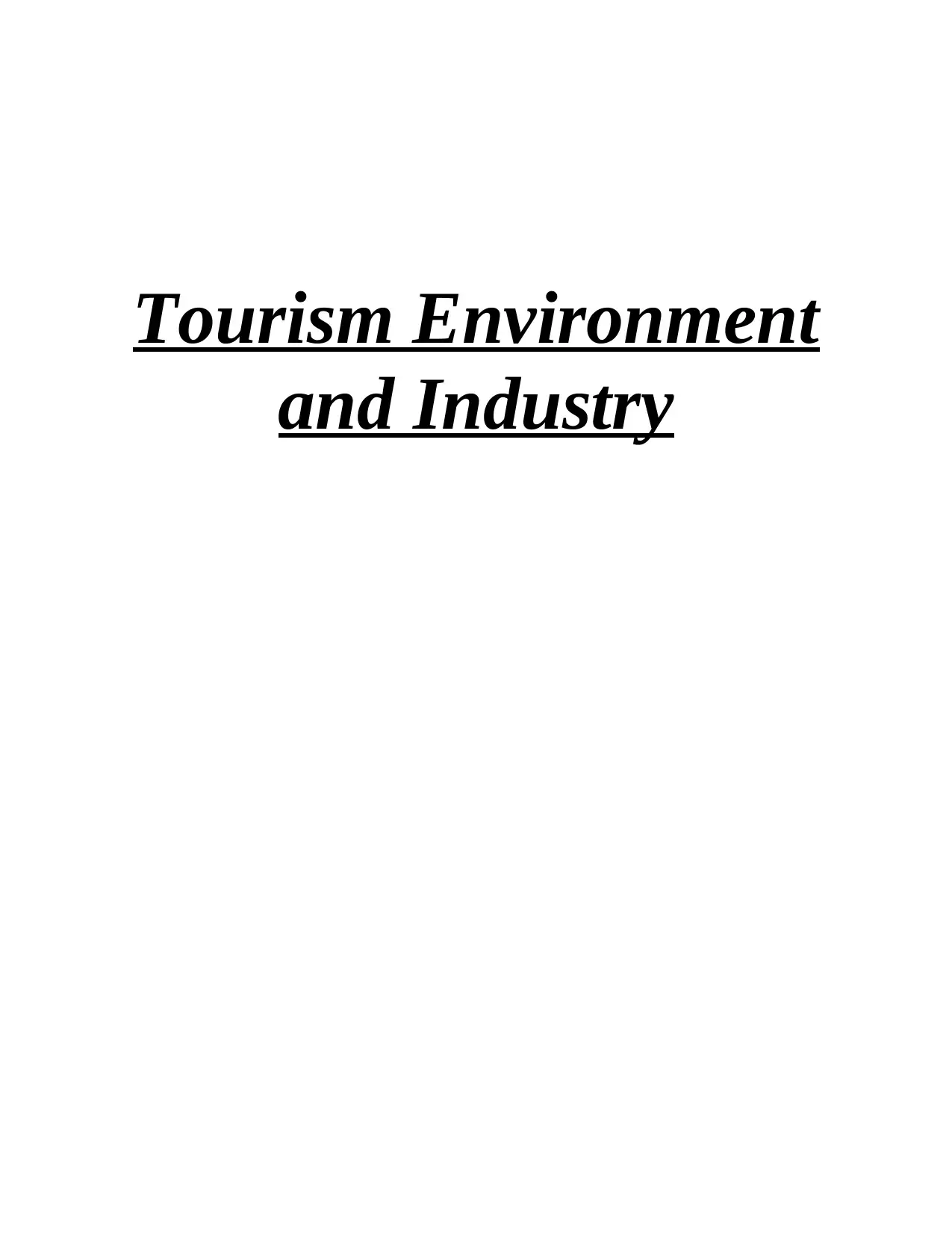
Tourism Environment
and Industry
and Industry
Paraphrase This Document
Need a fresh take? Get an instant paraphrase of this document with our AI Paraphraser
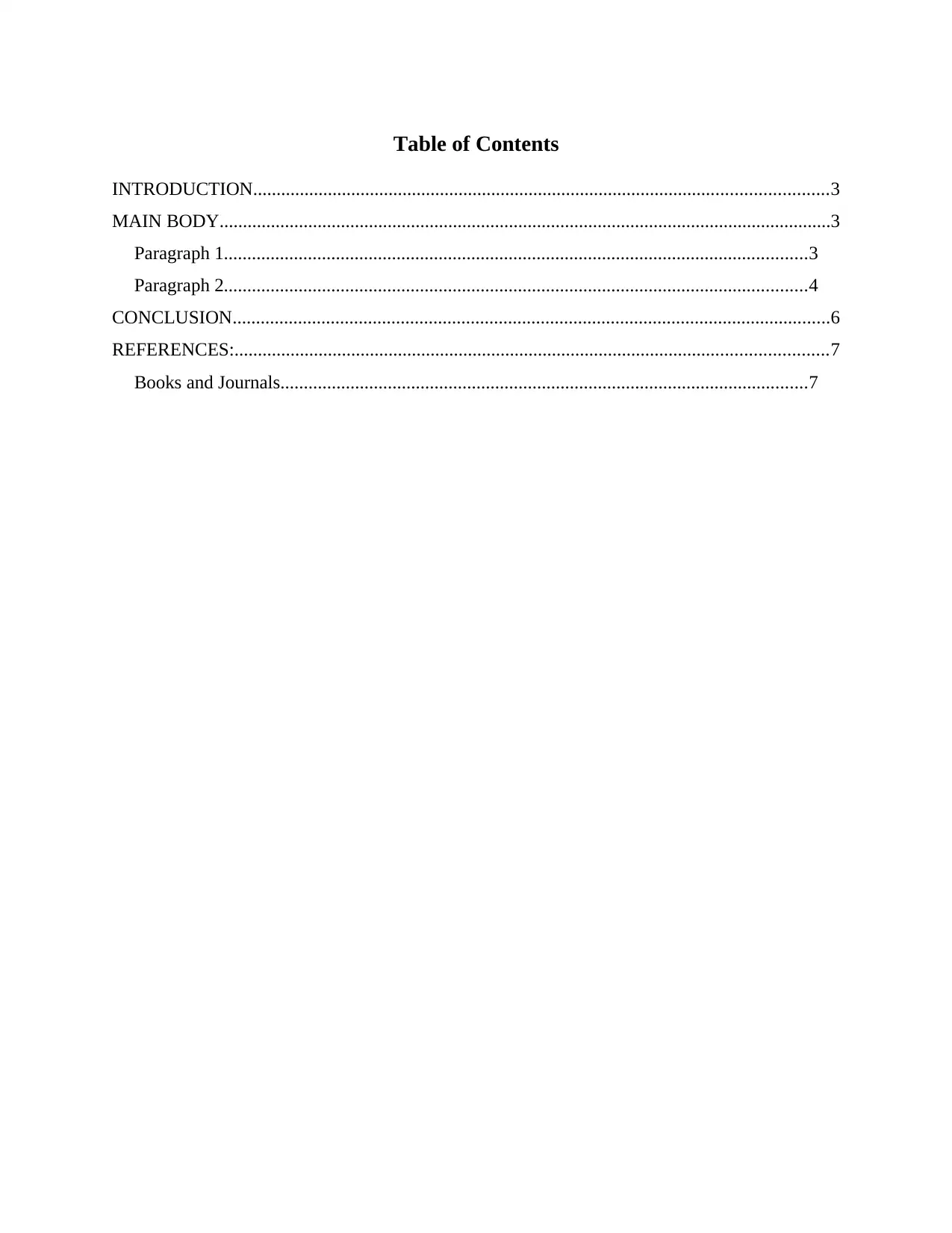
Table of Contents
INTRODUCTION...........................................................................................................................3
MAIN BODY...................................................................................................................................3
Paragraph 1.............................................................................................................................3
Paragraph 2.............................................................................................................................4
CONCLUSION................................................................................................................................6
REFERENCES:...............................................................................................................................7
Books and Journals.................................................................................................................7
INTRODUCTION...........................................................................................................................3
MAIN BODY...................................................................................................................................3
Paragraph 1.............................................................................................................................3
Paragraph 2.............................................................................................................................4
CONCLUSION................................................................................................................................6
REFERENCES:...............................................................................................................................7
Books and Journals.................................................................................................................7
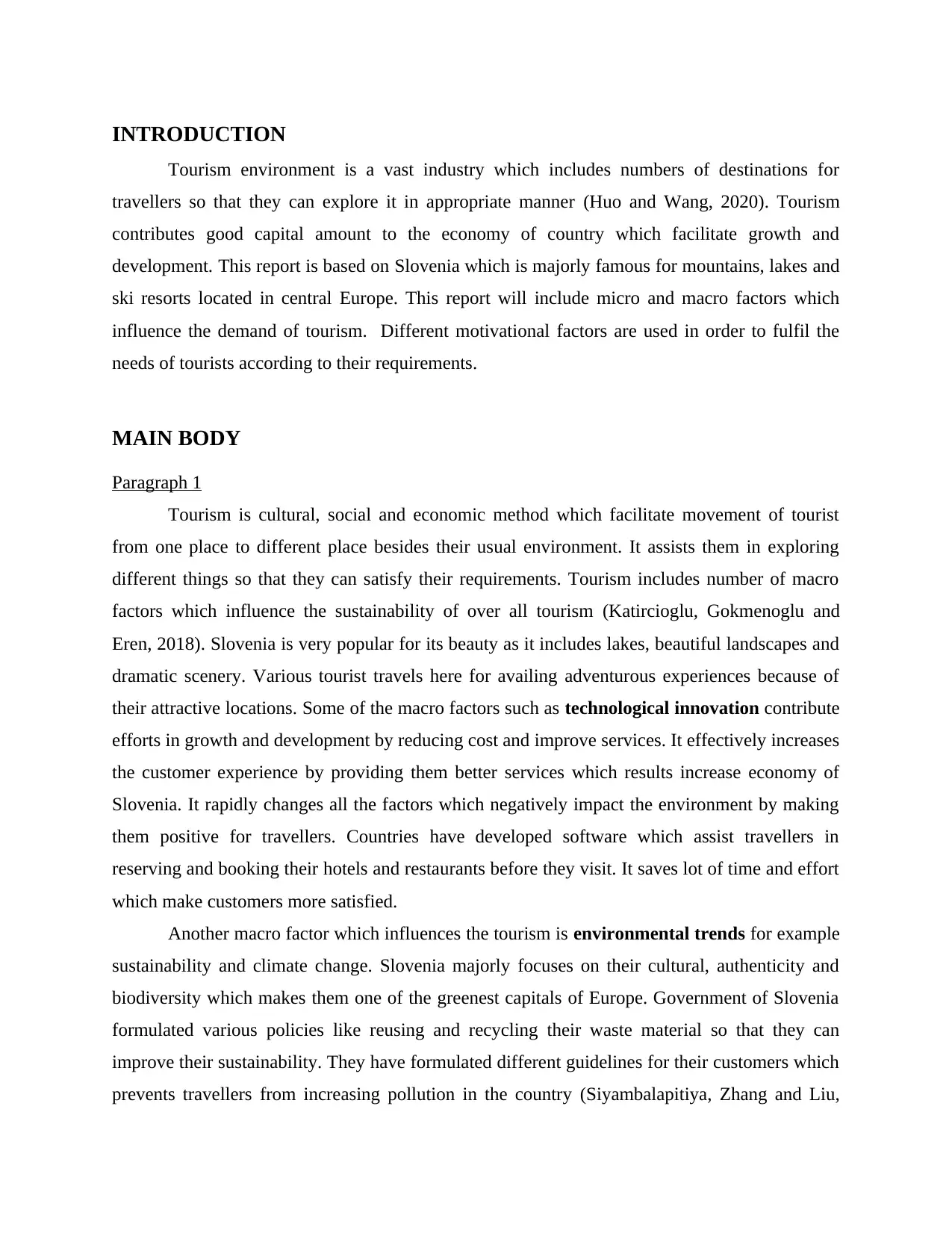
INTRODUCTION
Tourism environment is a vast industry which includes numbers of destinations for
travellers so that they can explore it in appropriate manner (Huo and Wang, 2020). Tourism
contributes good capital amount to the economy of country which facilitate growth and
development. This report is based on Slovenia which is majorly famous for mountains, lakes and
ski resorts located in central Europe. This report will include micro and macro factors which
influence the demand of tourism. Different motivational factors are used in order to fulfil the
needs of tourists according to their requirements.
MAIN BODY
Paragraph 1
Tourism is cultural, social and economic method which facilitate movement of tourist
from one place to different place besides their usual environment. It assists them in exploring
different things so that they can satisfy their requirements. Tourism includes number of macro
factors which influence the sustainability of over all tourism (Katircioglu, Gokmenoglu and
Eren, 2018). Slovenia is very popular for its beauty as it includes lakes, beautiful landscapes and
dramatic scenery. Various tourist travels here for availing adventurous experiences because of
their attractive locations. Some of the macro factors such as technological innovation contribute
efforts in growth and development by reducing cost and improve services. It effectively increases
the customer experience by providing them better services which results increase economy of
Slovenia. It rapidly changes all the factors which negatively impact the environment by making
them positive for travellers. Countries have developed software which assist travellers in
reserving and booking their hotels and restaurants before they visit. It saves lot of time and effort
which make customers more satisfied.
Another macro factor which influences the tourism is environmental trends for example
sustainability and climate change. Slovenia majorly focuses on their cultural, authenticity and
biodiversity which makes them one of the greenest capitals of Europe. Government of Slovenia
formulated various policies like reusing and recycling their waste material so that they can
improve their sustainability. They have formulated different guidelines for their customers which
prevents travellers from increasing pollution in the country (Siyambalapitiya, Zhang and Liu,
Tourism environment is a vast industry which includes numbers of destinations for
travellers so that they can explore it in appropriate manner (Huo and Wang, 2020). Tourism
contributes good capital amount to the economy of country which facilitate growth and
development. This report is based on Slovenia which is majorly famous for mountains, lakes and
ski resorts located in central Europe. This report will include micro and macro factors which
influence the demand of tourism. Different motivational factors are used in order to fulfil the
needs of tourists according to their requirements.
MAIN BODY
Paragraph 1
Tourism is cultural, social and economic method which facilitate movement of tourist
from one place to different place besides their usual environment. It assists them in exploring
different things so that they can satisfy their requirements. Tourism includes number of macro
factors which influence the sustainability of over all tourism (Katircioglu, Gokmenoglu and
Eren, 2018). Slovenia is very popular for its beauty as it includes lakes, beautiful landscapes and
dramatic scenery. Various tourist travels here for availing adventurous experiences because of
their attractive locations. Some of the macro factors such as technological innovation contribute
efforts in growth and development by reducing cost and improve services. It effectively increases
the customer experience by providing them better services which results increase economy of
Slovenia. It rapidly changes all the factors which negatively impact the environment by making
them positive for travellers. Countries have developed software which assist travellers in
reserving and booking their hotels and restaurants before they visit. It saves lot of time and effort
which make customers more satisfied.
Another macro factor which influences the tourism is environmental trends for example
sustainability and climate change. Slovenia majorly focuses on their cultural, authenticity and
biodiversity which makes them one of the greenest capitals of Europe. Government of Slovenia
formulated various policies like reusing and recycling their waste material so that they can
improve their sustainability. They have formulated different guidelines for their customers which
prevents travellers from increasing pollution in the country (Siyambalapitiya, Zhang and Liu,
⊘ This is a preview!⊘
Do you want full access?
Subscribe today to unlock all pages.

Trusted by 1+ million students worldwide
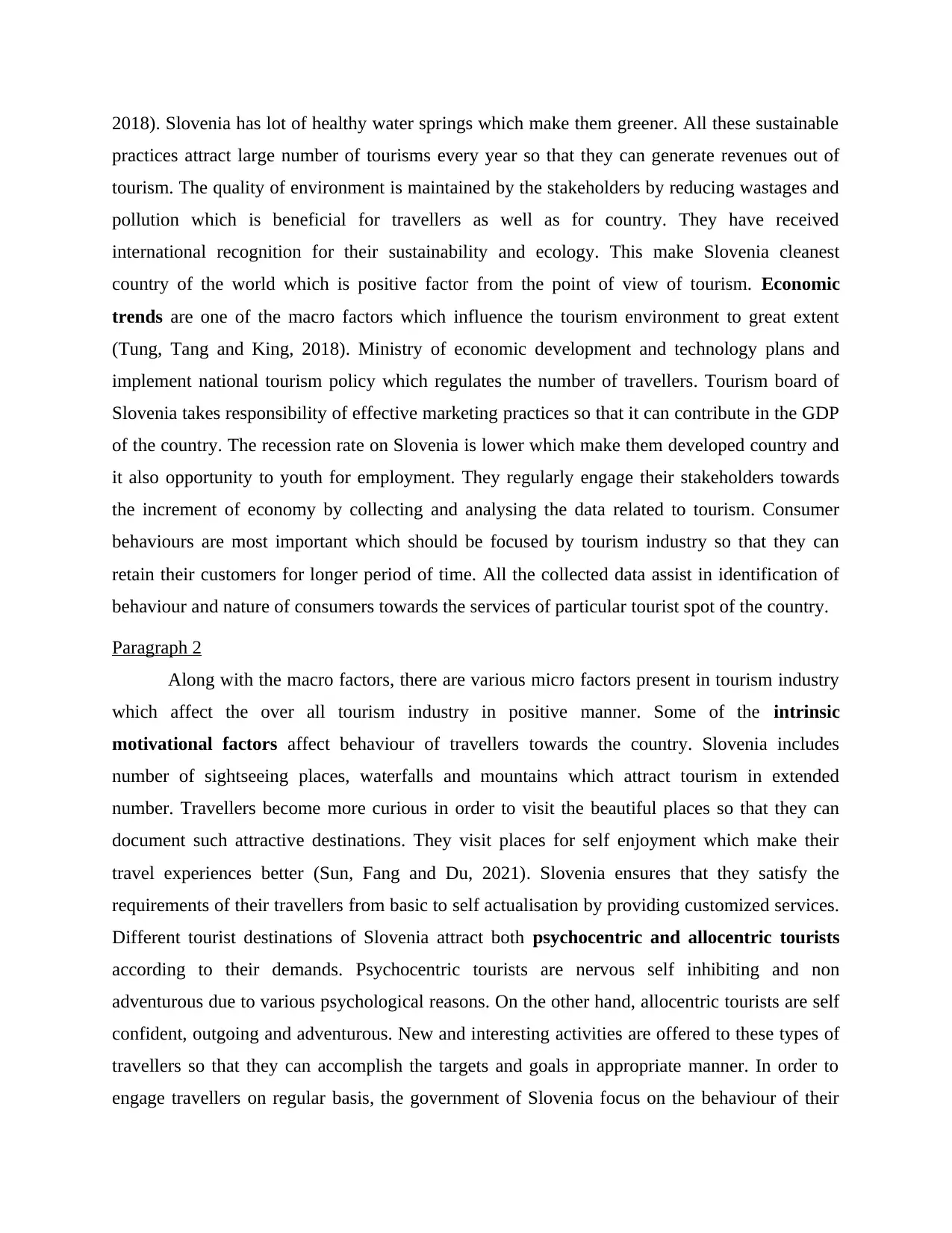
2018). Slovenia has lot of healthy water springs which make them greener. All these sustainable
practices attract large number of tourisms every year so that they can generate revenues out of
tourism. The quality of environment is maintained by the stakeholders by reducing wastages and
pollution which is beneficial for travellers as well as for country. They have received
international recognition for their sustainability and ecology. This make Slovenia cleanest
country of the world which is positive factor from the point of view of tourism. Economic
trends are one of the macro factors which influence the tourism environment to great extent
(Tung, Tang and King, 2018). Ministry of economic development and technology plans and
implement national tourism policy which regulates the number of travellers. Tourism board of
Slovenia takes responsibility of effective marketing practices so that it can contribute in the GDP
of the country. The recession rate on Slovenia is lower which make them developed country and
it also opportunity to youth for employment. They regularly engage their stakeholders towards
the increment of economy by collecting and analysing the data related to tourism. Consumer
behaviours are most important which should be focused by tourism industry so that they can
retain their customers for longer period of time. All the collected data assist in identification of
behaviour and nature of consumers towards the services of particular tourist spot of the country.
Paragraph 2
Along with the macro factors, there are various micro factors present in tourism industry
which affect the over all tourism industry in positive manner. Some of the intrinsic
motivational factors affect behaviour of travellers towards the country. Slovenia includes
number of sightseeing places, waterfalls and mountains which attract tourism in extended
number. Travellers become more curious in order to visit the beautiful places so that they can
document such attractive destinations. They visit places for self enjoyment which make their
travel experiences better (Sun, Fang and Du, 2021). Slovenia ensures that they satisfy the
requirements of their travellers from basic to self actualisation by providing customized services.
Different tourist destinations of Slovenia attract both psychocentric and allocentric tourists
according to their demands. Psychocentric tourists are nervous self inhibiting and non
adventurous due to various psychological reasons. On the other hand, allocentric tourists are self
confident, outgoing and adventurous. New and interesting activities are offered to these types of
travellers so that they can accomplish the targets and goals in appropriate manner. In order to
engage travellers on regular basis, the government of Slovenia focus on the behaviour of their
practices attract large number of tourisms every year so that they can generate revenues out of
tourism. The quality of environment is maintained by the stakeholders by reducing wastages and
pollution which is beneficial for travellers as well as for country. They have received
international recognition for their sustainability and ecology. This make Slovenia cleanest
country of the world which is positive factor from the point of view of tourism. Economic
trends are one of the macro factors which influence the tourism environment to great extent
(Tung, Tang and King, 2018). Ministry of economic development and technology plans and
implement national tourism policy which regulates the number of travellers. Tourism board of
Slovenia takes responsibility of effective marketing practices so that it can contribute in the GDP
of the country. The recession rate on Slovenia is lower which make them developed country and
it also opportunity to youth for employment. They regularly engage their stakeholders towards
the increment of economy by collecting and analysing the data related to tourism. Consumer
behaviours are most important which should be focused by tourism industry so that they can
retain their customers for longer period of time. All the collected data assist in identification of
behaviour and nature of consumers towards the services of particular tourist spot of the country.
Paragraph 2
Along with the macro factors, there are various micro factors present in tourism industry
which affect the over all tourism industry in positive manner. Some of the intrinsic
motivational factors affect behaviour of travellers towards the country. Slovenia includes
number of sightseeing places, waterfalls and mountains which attract tourism in extended
number. Travellers become more curious in order to visit the beautiful places so that they can
document such attractive destinations. They visit places for self enjoyment which make their
travel experiences better (Sun, Fang and Du, 2021). Slovenia ensures that they satisfy the
requirements of their travellers from basic to self actualisation by providing customized services.
Different tourist destinations of Slovenia attract both psychocentric and allocentric tourists
according to their demands. Psychocentric tourists are nervous self inhibiting and non
adventurous due to various psychological reasons. On the other hand, allocentric tourists are self
confident, outgoing and adventurous. New and interesting activities are offered to these types of
travellers so that they can accomplish the targets and goals in appropriate manner. In order to
engage travellers on regular basis, the government of Slovenia focus on the behaviour of their
Paraphrase This Document
Need a fresh take? Get an instant paraphrase of this document with our AI Paraphraser
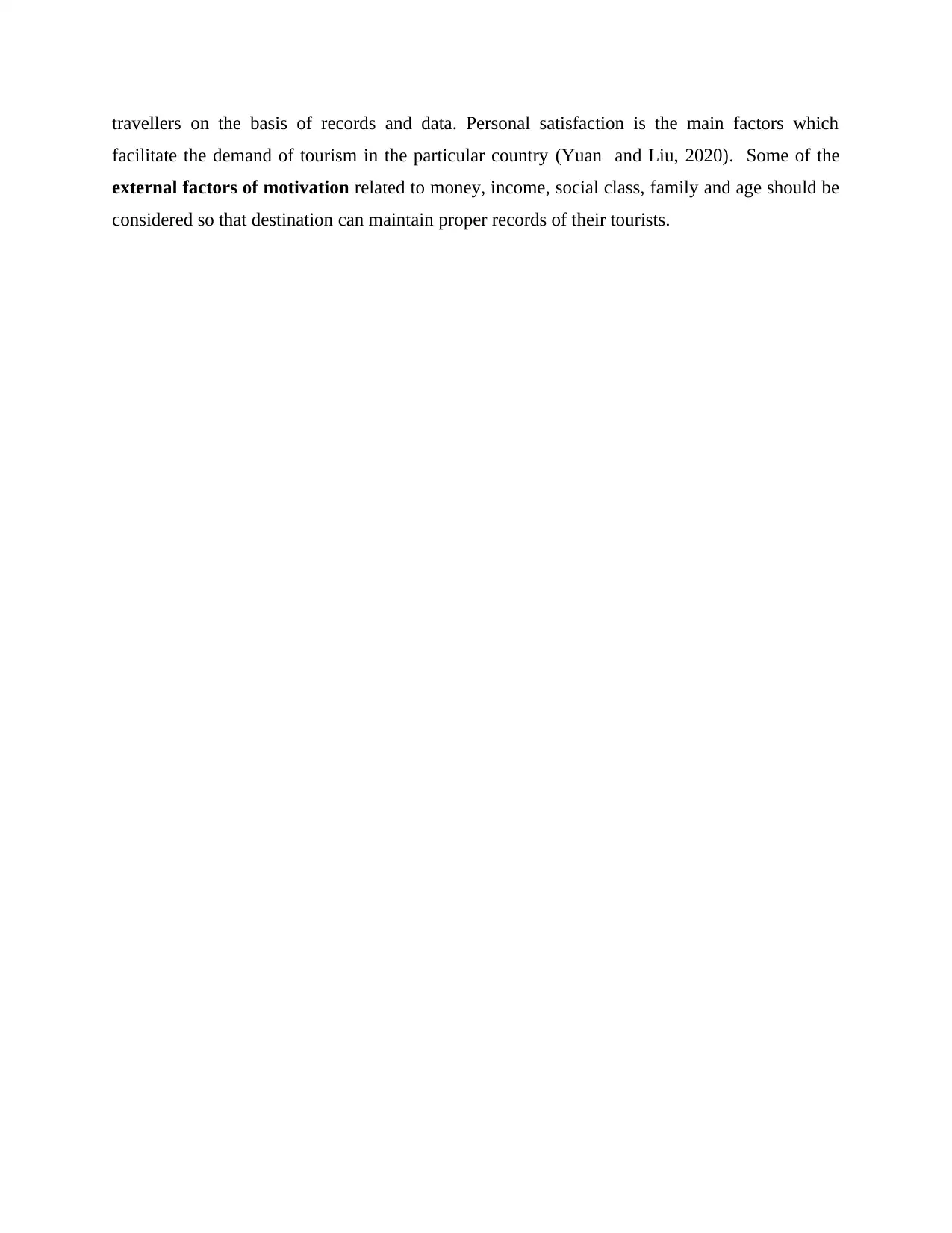
travellers on the basis of records and data. Personal satisfaction is the main factors which
facilitate the demand of tourism in the particular country (Yuan and Liu, 2020). Some of the
external factors of motivation related to money, income, social class, family and age should be
considered so that destination can maintain proper records of their tourists.
facilitate the demand of tourism in the particular country (Yuan and Liu, 2020). Some of the
external factors of motivation related to money, income, social class, family and age should be
considered so that destination can maintain proper records of their tourists.
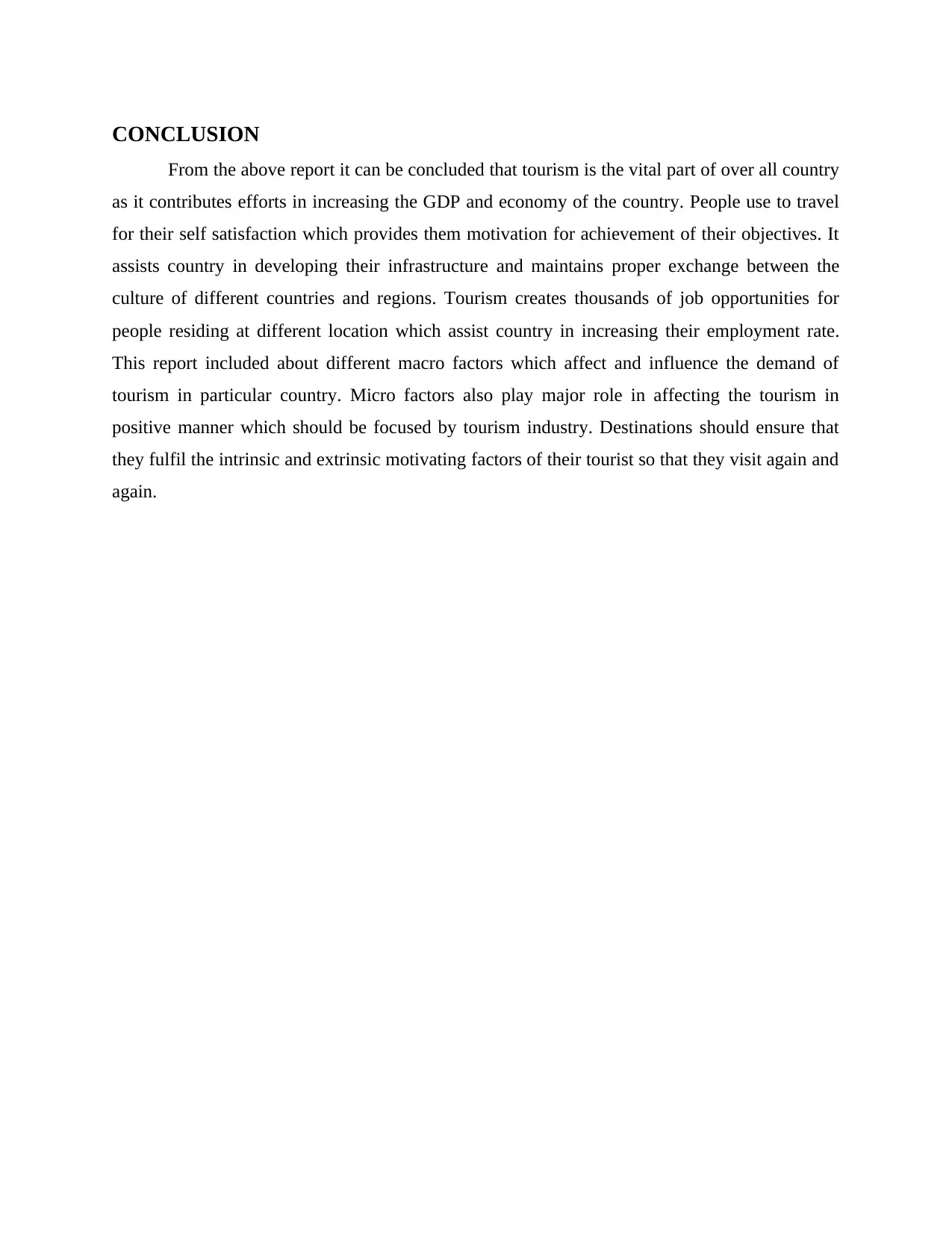
CONCLUSION
From the above report it can be concluded that tourism is the vital part of over all country
as it contributes efforts in increasing the GDP and economy of the country. People use to travel
for their self satisfaction which provides them motivation for achievement of their objectives. It
assists country in developing their infrastructure and maintains proper exchange between the
culture of different countries and regions. Tourism creates thousands of job opportunities for
people residing at different location which assist country in increasing their employment rate.
This report included about different macro factors which affect and influence the demand of
tourism in particular country. Micro factors also play major role in affecting the tourism in
positive manner which should be focused by tourism industry. Destinations should ensure that
they fulfil the intrinsic and extrinsic motivating factors of their tourist so that they visit again and
again.
From the above report it can be concluded that tourism is the vital part of over all country
as it contributes efforts in increasing the GDP and economy of the country. People use to travel
for their self satisfaction which provides them motivation for achievement of their objectives. It
assists country in developing their infrastructure and maintains proper exchange between the
culture of different countries and regions. Tourism creates thousands of job opportunities for
people residing at different location which assist country in increasing their employment rate.
This report included about different macro factors which affect and influence the demand of
tourism in particular country. Micro factors also play major role in affecting the tourism in
positive manner which should be focused by tourism industry. Destinations should ensure that
they fulfil the intrinsic and extrinsic motivating factors of their tourist so that they visit again and
again.
⊘ This is a preview!⊘
Do you want full access?
Subscribe today to unlock all pages.

Trusted by 1+ million students worldwide
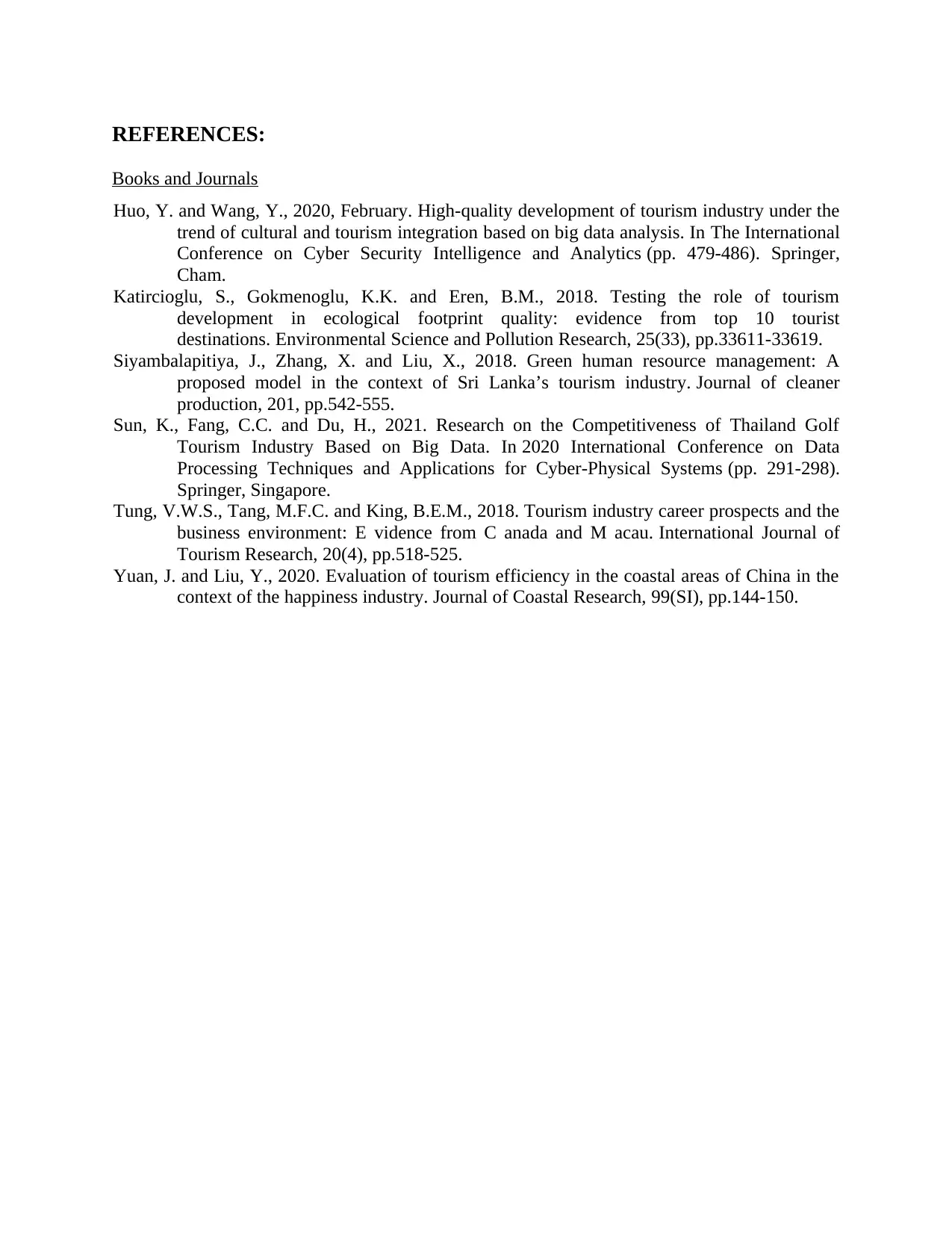
REFERENCES:
Books and Journals
Huo, Y. and Wang, Y., 2020, February. High-quality development of tourism industry under the
trend of cultural and tourism integration based on big data analysis. In The International
Conference on Cyber Security Intelligence and Analytics (pp. 479-486). Springer,
Cham.
Katircioglu, S., Gokmenoglu, K.K. and Eren, B.M., 2018. Testing the role of tourism
development in ecological footprint quality: evidence from top 10 tourist
destinations. Environmental Science and Pollution Research, 25(33), pp.33611-33619.
Siyambalapitiya, J., Zhang, X. and Liu, X., 2018. Green human resource management: A
proposed model in the context of Sri Lanka’s tourism industry. Journal of cleaner
production, 201, pp.542-555.
Sun, K., Fang, C.C. and Du, H., 2021. Research on the Competitiveness of Thailand Golf
Tourism Industry Based on Big Data. In 2020 International Conference on Data
Processing Techniques and Applications for Cyber-Physical Systems (pp. 291-298).
Springer, Singapore.
Tung, V.W.S., Tang, M.F.C. and King, B.E.M., 2018. Tourism industry career prospects and the
business environment: E vidence from C anada and M acau. International Journal of
Tourism Research, 20(4), pp.518-525.
Yuan, J. and Liu, Y., 2020. Evaluation of tourism efficiency in the coastal areas of China in the
context of the happiness industry. Journal of Coastal Research, 99(SI), pp.144-150.
Books and Journals
Huo, Y. and Wang, Y., 2020, February. High-quality development of tourism industry under the
trend of cultural and tourism integration based on big data analysis. In The International
Conference on Cyber Security Intelligence and Analytics (pp. 479-486). Springer,
Cham.
Katircioglu, S., Gokmenoglu, K.K. and Eren, B.M., 2018. Testing the role of tourism
development in ecological footprint quality: evidence from top 10 tourist
destinations. Environmental Science and Pollution Research, 25(33), pp.33611-33619.
Siyambalapitiya, J., Zhang, X. and Liu, X., 2018. Green human resource management: A
proposed model in the context of Sri Lanka’s tourism industry. Journal of cleaner
production, 201, pp.542-555.
Sun, K., Fang, C.C. and Du, H., 2021. Research on the Competitiveness of Thailand Golf
Tourism Industry Based on Big Data. In 2020 International Conference on Data
Processing Techniques and Applications for Cyber-Physical Systems (pp. 291-298).
Springer, Singapore.
Tung, V.W.S., Tang, M.F.C. and King, B.E.M., 2018. Tourism industry career prospects and the
business environment: E vidence from C anada and M acau. International Journal of
Tourism Research, 20(4), pp.518-525.
Yuan, J. and Liu, Y., 2020. Evaluation of tourism efficiency in the coastal areas of China in the
context of the happiness industry. Journal of Coastal Research, 99(SI), pp.144-150.
1 out of 7
Related Documents
Your All-in-One AI-Powered Toolkit for Academic Success.
+13062052269
info@desklib.com
Available 24*7 on WhatsApp / Email
![[object Object]](/_next/static/media/star-bottom.7253800d.svg)
Unlock your academic potential
Copyright © 2020–2025 A2Z Services. All Rights Reserved. Developed and managed by ZUCOL.



